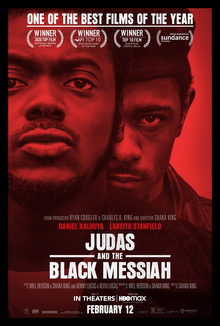It feels like Daniel Kaluuya is in all of the good black American films these days. Not bad for a guy who isn’t even American but this is most certainly an excellent film. I don’t think director Shaka King has done much else of note on the big screen but this is a very impressive, well-rounded biographical drama. Though it is about events in the late 1960s it feels highly relevant today and it seems like the right time to reexamine American’s historical perception of the Black Panthers. I have no particular knowledge of this history but from what I can tell, shocking as this account is, it all seems broadly true.
In Chicago, Bill O’Neal tries to steal a car by pretending to be an FBI agent but is quickly caught. A real agent Roy Mitchell affably threatens him with a five-year jail sentence unless O’Neal agrees to infiltrate and inform on the Black Panthers on behalf of the FBI. Director J. Edgar Hoover himself has identified the chairman of the Illinois chapter, Fred Hampton, as a threat especially after Hampton is able to reach out to poor white and Hispanic groups who are all being victimized by the police. O’Neal is accepted by the Black Panthers and quickly rises to become the chapter’s head of security even as he feeds information to Michell in return of money. Meanwhile Hampton falls in love with fellow member Deborah Johnson but is imprisoned on a petty charge while Johnson is pregnant. In his absence, O’Neal becomes an even more important figure in the group but he continues to work for the FBI. Soon enough the FBI isn’t content with merely keeping Hampton in prison but opts for a more permanent solution.
The title of this film gives away the angle it is going for and it absolutely works here. In fact, the film elevates itself above the usual biopics by its artistic touch. It shows how much care Hampton puts in choosing the words for his speeches and Johnson initially gets close to him by introducing herself as a poet. The soundtrack is amazing as well with so much music that feels totally appropriate for the period but is actually all new. Covering history is always tricky as the audience cannot be relied upon to have much background knowledge but the film gets it right by keeping the focus tightly on the local scene in Chicago. I admit that I was one of those who previously viewed the Black Panthers as a violent group and it’s clear after watching this and reading up on their history that this is exactly what US law enforcement wants people to believe and has devoted considerable effort to that end. At the same time, the film is clear that the Black Panthers did see themselves as a revolutionary movement, seeing Mao Zedong in China and Fidel Castro in Cuba, as comrades-in-arms, and that is hardly worthy company. Overall it’s well-balanced and very eye-opening.
As strong as this portrayal of the black power movement is, I’m even more of a fan of how it shows the way the authorities work. The FBI has so thoroughly infiltrated the Black Panthers that their supposed crimes seem largely instigated by the police themselves as we see O’Neal pushing Hampton to make use of bombs and other weapons provided by the FBI. The characterization of Mitchell here is great as well. He doesn’t seem to be particularly racist as he is happy to share a meal with O’Neal and even invite him into his own house. He does seem to genuinely believe that the Black Panthers are a dangerous, extremist group, the reverse side of the Ku Klux Klan which he also worked against. Yet his bosses are clearly racist and he give them a pass. When his supervisor explains to him that a murderer being sheltered by the Black Panthers is himself a paid FBI informant and they are using him to implicate the other members of the party, he is shocked and knows how wrong that is. Yet he gives that a pass as well and in meanwhile reaps the rewards of a well-compensated, decorated career. Reading up on the subject, the real Mitchell was indeed personally commended and given cash bonuses by Hoover for his work on being O’Neal’s handler.
To be clear, this film shows only a very small part of the history of the Black Panthers as a group and even here we see that some of them really were out to provoke a fight with the police. But as the aggrieved mother in this film says, the violence of the Black Panthers isn’t the whole story of the group and they deserve a fuller accounting in history. It is especially unjust that it is the authorities’ framing of the events that predominate given their own wrongdoing. I note that activist groups are still pursuing legal action to uncover the extent of Hoover’s involvement in O’Neal’s case and the release of this film will no doubt inspire more interest on the part of the public.
